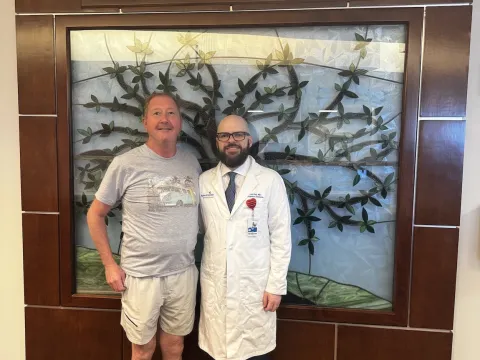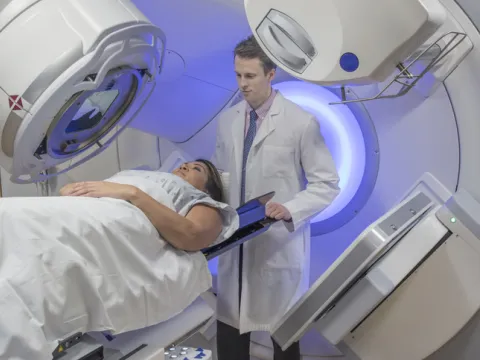- AdventHealth

Numerous studies in recent years have identified disturbance of gut microbial metabolism as a potential cause of chronic disease, leading researchers to begin studying the specific impact of the gut microbiome on cancers, including melanoma and colorectal cancers. Another study published last year in Communications Biology found that gut microbiome diversity is an independent predictor of survival in cervical cancer patients receiving chemoradiation.
Inspired by this research, along with her own passion for metabolic and lifestyle medicine, AdventHealth Cancer Institute gynecologic oncologist Nathalie D. McKenzie, MD, recently launched a pilot feasibility study to begin exploring the interplay of the gut microbiome on the efficacy of immunotherapy treatment for gynecological cancers.

“This initial study is observational,” explains McKenzie, noting that the collection of microorganisms in the gut – including bacteria, archaea, viruses, and fungi – and their overall genetic information play an essential role in the health of its host, both in humans as well as animals.
The study is currently enrolling up to 30 participants with advanced or recurrent gynecological cancer who plan to receive immunotherapy treatment with a checkpoint inhibitor at AdventHealth.
“The gut microbiome’s key functions are all related to metabolism, immune system education and regulation, and protection against pathogen invasion,” McKenzie added. “This study will help us understand not only how the gut microbiome changes within the individual as they undergo immunotherapy, but also how it differs among patients throughout the course of their treatment.”
McKenzie, who is the principal investigator on this AdventHealth study, and her team will collect fecal, blood, saliva and vaginal samples three times: 1) prior to first treatment, 2) after four doses of immunotherapy, and 3) at the completion of immunotherapy.
These four biomarker samples will undergo metatranscriptomic analysis. Also known as RNA-seq, this method of sample analysis will only sequence RNA molecules while DNA is degraded to allow for bacterial community analysis. In addition, study participants will complete a National Health and Nutrition Examination Survey (NHANES) Food Frequency Questionnaire prior to their first treatments.
The findings of this pilot feasibility study will help design a larger study to further examine the role of the gut microbiome in anti-tumor immunity and its effect on immune checkpoint inhibitor therapy for advanced or recurrent gynecological cancers.
“This study is just the first step,” shares McKenzie. “It will help us better understand the specific metabolites and bacteria that could impact treatment.”
This study is part of a collaboration with Viome Life Sciences, a systems biology and artificial intelligence company working to develop next generation of diagnostics and therapeutics to detect disease earlier and improve treatment.
AdventHealth collects the data and Viome analyzes the clinical specimens.
“From the specimens, we can generate vast amounts of molecular data relevant to chronic diseases and cancers,” said Momo Vuyisich, PhD, Viome Life Sciences chief science officer. “Machine learning and artificial intelligence then makes sense of the data and translates the findings into clinically useful diagnostics and therapeutics.”

Ultimately, McKenzie hopes to conduct additional studies to determine if specific interventions can be applied to influence the gut microbiome and create a better response to immunotherapy for gynecologic cancer patients.
“Using the principles of precision medicine, I want to explore if we can enhance efficacy and outcomes for our patients through lifestyle changes, nutraceuticals, oncology-specific microbial therapeutics or some combination of these approaches,” said McKenzie. “This is an exciting area of research, and I think we have multiple opportunities to improve and optimize cancer care — through prevention, pre-therapy preparation, therapy support and post-therapy protocols — to help women recover better, faster and with greater quality of life.”
Physicians with questions about this study or a specific gynecologic oncology case can contact AdventHealth GYN Oncology Nurse Navigator Althea Buckner, MSN, APRN-AOCNP, at Call407-303-5909.
Recent News

AdventHealth Cancer Institute Advances the Use of CAR T-Cell Therapy for Multiple Myeloma
CAR-T therapies have emerged as new treatment options for certain types of cancer through a one-time infusion that can lead to long-lasting remission.

AdventHealth Graduate Medical Education Program Celebrates 50 Years
Growing from a family practice residency to 24 accredited programs, AdventHealth’s Graduate Medical Education (GME) program celebrates 50 years.

New Clinical Trial Explores Digital Intervention for Apathy in Late-life Depression
Afflicting 30-50% of patients with late-life depression, apathy is a challenging psychiatric syndrome in older adulthood that can result in lack of motivation leading to poor self-care, physical...

AdventHealth Performs Central Florida’s First Liver Transplant for Unresectable Colorectal Liver Metastases
In June 2025, AdventHealth Abdominal Transplant Surgeon and Surgical Oncologist Ryan Day, MD, worked with a multidisciplinary team to perform Central Florida’s first liver transplant for unresectable...

AdventHealth Neuroscience Institute First in Florida to be Recognized as a GammaTile Center of Excellence
GammaTile is the first and only tile-based radiation therapy for the treatment of
operable brain tumors. The AdventHealth Neuroscience Institute began performing GammaTile procedures in 2021 and was...

An AdventHealth Collaboration Explores the Impact of Microgravity and Electrical Stimulation on Muscle Cell Health in Space
Using a muscle lab-on-chip model aboard the International Space Station (ISS), AdventHealth Translational Research Institute’s Dr. Paul Coen has been working with a multidisciplinary team from the...

AdventHealth Neuroscience Institute Among First in U.S. to Offer Phase IIa Clinical Trial of Troculeucel for Moderate Alzheimer’s Disease
While most clinical trials for Alzheimer’s disease have focused on patients with early or mild cognitive impairment, roughly 30% of those with Alzheimer’s have moderate stage disease for which there...

AdventHealth Translational Research Institute Selected as Clinical Site for National Study of Muscle, Mobility and Aging (SOMMA)
Under the leadership of Scientific Director and Principal Investigator Bret H. Goodpaster, PhD, the AdventHealth Translational Research Institute (TRI) is now enrolling men and women 70 years of age...

AdventHealth Neuroscience Institute Administers First Dose of Investigative NK Cell Therapy to Person with Alzheimer’s Disease
Under a single compassionate use Investigational New Drug (IND) authorization cleared by the U.S. Food and Drug Administration (FDA), the AdventHealth Neuroscience Institute worked with NKGen Biotech...

New Study Published in the New England Journal of Medicine Shows the Addition of Regional Nodal Irradiation Does Not Decrease Rate of Invasive Breast Cancer Recurrence in Patients with Negative Axillary Nodes Following Neoadjuvant Chemotherapy
Findings of the phase III, multicenter, randomized NSABP B-51-RTOG 1304 clinical trial were recently published in the New England Journal of Medicine with AdventHealth Cancer Institute’s Dr. Mamounas...

AdventHealth Study Exploring the Use of MR-Guided Focused Ultrasound (MRgFUS) to Disrupt the Blood-Brain Barrier for Treatment of Alzheimer’s Disease
Under the leadership of Dr. Valeria Baldivieso and Dr. Chandan Reddy, the AdventHealth Research Institute is the first and only site in Orlando offering the Exablate Blood-Brain Barrier (BBB)...

AdventHealth Research Institute Offers Phase II Clinical Trial of Etanercept for Treatment of Blast-Induced Tinnitus
Approximately 1 billion people throughout the world suffer from tinnitus (ringing in the ears), and it is the number one disability of those who serve in the U.S. military. The condition can disrupt...
